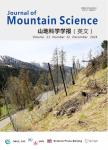Validation of Global Land Surface Satellite (GLASS) Downward Shortwave Radiation Product in the Rugged Surface
Validation of Global Land Surface Satellite (GLASS) Downward Shortwave Radiation Product in the Rugged Surface作者机构:Institute of Mountain Hazards and EnvironmentChinese Academy of Sciences Department of Geographical SciencesUniversity of MarylandCollege Park
出 版 物:《Journal of Mountain Science》 (山地科学学报(英文))
年 卷 期:2013年第10卷第5期
页 面:812-823页
核心收录:
学科分类:07[理学] 070601[理学-气象学] 0706[理学-大气科学]
基 金:supported jointly by the "Hundred Talents" Projects of Chinese Academy of Sciences (CAS) and Sichuan Province Strategic Priority Research Program-Climate Change: Carbon Budget and Related Issues (Grant No. XDA05050105) International Cooperation Partner Program of Innovative Team, CAS (Grant No. KZZD-EW-TZ-06) Open Foundation of BNU Center for Global Change Data Processing and Analysis Young Foundation of Institute of Mountain Hazards and Environment, CAS
主 题:Downward shortwave radiation Validation Complex terrain
摘 要:The downward shortwave radiation(DSR) is an essential parameter of land surface radiation budget and many land surface models that characterize hydrological,ecological and biogeochemical *** new Global LAnd Surface Satellite(GLASS) DSR datasets have been generated recently using multiple satellite data in *** study investigates the performances of direct comparison approach,which is mostly used for validation of surface insolation retrieved from satellite data over the plain area,and indirect comparison approach,which needs a fine resolution map of DSR as reference,for validation of GLASS DSR product in time-steps of 1 and 3 hours over three Chinese Ecosystem Research Network sites located in the rugged *** suggest that it probably has a large uncertainty to assess GLASS DSR product using the direct comparison method between GLASS surface insolation and field measurements over complex terrain,especially at *** 3,000 m station with root mean square error of 279.04 and 229.06 W/m2in time-steps of 1 and 3 hours,*** improvement for validation of GLASS DSR product in the rugged surface is suggested by generation of a fine resolution map of surface insolation and comparison of the aggregated fine resolution map with GLASS product in the rugged *** validation experience demonstrates that the GLASS DSR algorithm is satisfactory with determination coefficient of 0.83 and root mean square error of 81.91W/m2over three Chinese Ecosystem Research Network sites,although GLASS product overestimates DSR compared to the aggregated fine resolution map of surface insolation.



